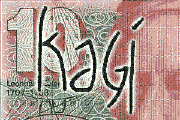

US Social Security Numbers on personal checks
Are you crazy?If you have your social security number on your personal checks, your credit rating is in extreme danger. Immediately order new checks without your social security number on them and either stop using your existing checks or at the very least, make sure that the number is not readable when you cash a check. Here is the danger...
It is very simple for someone to ruin your credit rating with your name, Social Security number, and your address.
They can go to any department store and apply for instant credit.
They fill out the form and apply for credit using your name and social security number.
They give your address as their previous address and they give a bogus address as their current address.
They fabricate false information for the rest of the questions on the form.
When the department store verifies their application information, everything checks out.
They then repeat this proceedure at other department stores to gain additional credit cards.
They can charge as much as they like up to the maximum limits and of course never pay any of the bills.
All the "please pay" notices will go to the wrong address so that for the first month or two you will have no idea that this is happening.Eventually when your credit is ruined, collection agencies will track you down and demand that you pay these bills and you will spend a great deal of time trying to straighten everything out (if that is possible). According to an article I read, after five years some people still have hassles with their credit reports. Some people have gone so far as to contact the Social Security department and request a new social security number because their original one is so tainted that the credit history associated with it will never be fixed.
If you still are casual about putting your Social Security number on your checks, contact the Privacy Rights Clearinghouse in San Diego at (800) 773-7748. They provide free leaflets titled "Coping with Identity Theft," "My Social Security Number: How Secure Is It?" and "How Private Is My Credit Report?".
If you want even more convincing, read the excerpt below from a Virginia court decision that barred the Virginia Voter Registration system from publishing the social security numbers of Virginia voters.
Since the passage of the Privacy Act, an individual's concern over his SSN's confidentiality and misuse has become significantly more compelling. For example, armed with one's SSN, an unscrupulous individual could obtain a person's welfare benefits or Social Security benefits, order new checks at a new address on that person's checking account, obtain credit cards, or even obtain the person's paycheck. Elizabeth Neuffer, Victims Urge Crackdown on Identity Theft, BOSTON GLOBE, July 9, 1991, at 13, 20 (In Massachusetts, "[a]uthorities say that, with another person's Social Security number, a thief can obtain that person's welfare benefits, Social Security benefits, credit cards or even the victim's paycheck."); Michael Quint, Bank Robbers' Latest Weapon: Social Security Numbers , N.Y. Times, September 27, 1992, at 7 (SSN can be used to order new checks at a new address).8 In California, reported cases of fraud involving the use of SSNs have increased from 390 cases in 1988 to over 800 in 1991. Y. Anwar, Thieves Hit Social Security Numbers, San Francisco Chronicle, August 30, 1991, A1, A2. Succinctly stated, the harm that can be inflicted from the disclosure of a SSN to an unscrupulous individual is alarming and potentially financially ruinous. These are just examples, and our review is by no means exhaustive; we highlight a few to elucidate the egregiousness of the harm.8 In greater detail, the Quint article paints a rather frightening portrait of what harm can come by the disclosure of an individual's SSN:
For example, a Manhattan executive returned from vacation last month to a call from Citibank asking her about an unusual pattern of transactions in her accounts. Someone, armed with her Social Security number, had called the bank to request a change of address and order new checks (billed to her account, of course) and a replacement bank card.
Not content with plundering the checking account, the thief, whose identity has not been determined, also sought and received approval for telephone banking, allowing money to be transferred from the executive's account to her account by telephone. Because she had been accumulating money in the savings account to pay for home renovations, the thief found a lode much larger than normal for an individual's checking account.
Additionally you can obtain information about identity theft by going to the Public Interest Research Group web site.
The Christian Science Monitor ran a very good article on Identity Theft
Modification Date: Friday, June 13, 1997